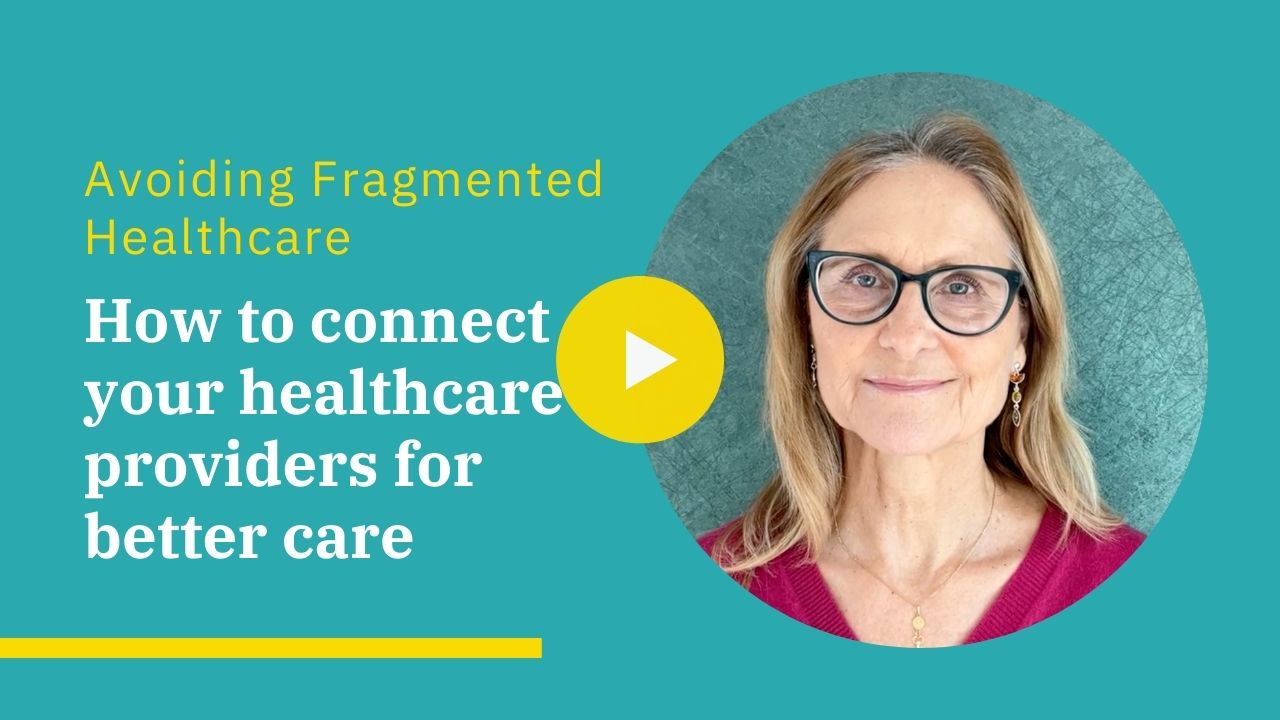Connecting Your Healthcare Dots – How to Manage Slivercare
Specialists specialize. In this video, we cover 3 key steps you can take to go from fragmented "slivercare" to integrated health and care – with you and your needs at the center.
You have the power to help your providers connect your particular healthcare dots by communicating with them. When you address unconnected care or “slivercare” head on, you can have better health results.
Sign up to be the first to know about new healthcare tips.
You'll also receive healthcare insights, stories, tools, and expert tips straight to your inbox.
Video Transcript
I've learned that in the US, we have the greatest healthcare in the world. If you can figure out how to get it. I call it "slivercare". Where it can take a bevy of specialists to complete the circle of care.
If you or a loved one has an ongoing condition that requires more than one type of doctor or healthcare provider, and that's a lot of us, you know what I mean. So it's essential that we play a role in coordinating our care. But how? It feels so overwhelming.
When my former husband had a health crisis, the painful reality of slivercare fell squarely in our laps. Knee replacement surgery and the care needed afterward was compounded by an underlying mental health condition. And it set off a mini tsunami of care coordination and communication across multiple specialists. The surgeon, well, he had tunnel vision, missing all the other health cues not related to the knee. It took a near health disaster and a forceful reality-check conversation that was initiated by me to pull us all onto the same page. And when I questioned the surgeon's tunnel vision, the home health nurse on our team, she said to me, "You know, you really don't understand. This is the way it is.” To which I replied: "Well, you don't understand. I'm challenging the way it is.”
So for those of you who are coping with multiple clinicians managing your condition or that of a loved one, here are three tips for challenging slivercare so that you can connect your healthcare dots for better health.
Number one is awareness: Specialists, they specialize. It's up to you to bring issues outside of their domain to their attention. Keep that top of mind. Never assume.
Number two: keep track of your health history, also known as your medical history and use the portal available to you with your various clinicians. And when the technology allows, connect the doctors and other clinicians to one another through the portal. Many practices use MyChart.
And number 3: If on multiple medications, stick to one source, one pharmacy, so that you can benefit from comprehensive medication management. Your pharmacist is a vital member of your team, especially if you're taking two or more medicines. They'll give you a heads up if one of your doctors prescribes something that doesn't interact well with some of the things that you're already taking. And that's a big tip to keep in mind.
So, do you see more than one type of healthcare provider to manage your health? What tools do you use to keep your team In the loop? Tell us in the comments below what you do to proactively coordinate your health and the health of that of your family. What are your favorite tools and tips?
I'll respond with some additional tips of my own as well as those of other healthcare insiders. And I would love to share more of my thoughts and tips to help you and your audience create the mind-shift to health self-advocacy for themselves and their loved ones.
So, I'm available as a speaker to share this information with your online group, your community, your podcast audience, you name it. Click the link in the first comment to schedule 15 minutes with me and we'll see if we have a match.


